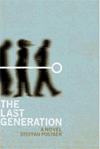To have and have not: thoughts on the human condition as it pertains to money.
November 7, 2011

“I want what you have.”
“Me too.”
I grew up under modest circumstances, living with my mother and brother on the first floor of a two-flat in the not yet gentrified Lakeview neighborhood of Chicago. The Latin Kings and the Latin Eagles still called it their “hood.” We attended public schools, walking or taking the CTA to get there. I was mugged countless times for my lunch money, though by some miracle never had my ass kicked. I did, however, lose my first payday ever to a lanky gang-banger with a huge knife. Blade to my throat, he made me remove my pants so I couldn’t run for help. I was twelve.
My grandmother and mother emigrated here from France, requiring sponsorship to do so. I cannot know the hardship they experienced in Europe and was blissfully unaware of how tight our situation really was. My single mother worked in a scruffy boutique on Broadway selling trendy clothes to bohemians and drag queens. My father was becoming successful in advertising but hadn’t yet made his financial bones. I saw him on Saturdays. Eventually, my parents and even grandmother all improved their circumstances and we became upwardly mobile, even borderline rich.
And so while this nation (and the world) struggles through grave economic turmoil, political pettiness and financial fraud, relentless debate over the greedy rich and the mistreated poor, I can legitimately say I’ve experienced both ends of the spectrum. And from this perspective I tell you that demonizing the rich is just as dopey as victimizing the poor. For the most part, neither is either.
I didn’t understand the bailing out of failed corporations any more than I get further taxing the wealthy to give their “fair share.” Both notions seem the same to me and equally wrong. It’s all so reactionary: the need for villains to explain hardship, the need for heroes to fix things. Pitting government against corporations is like fighting fire with fire. We all get burned.
There will always be the “haves” and “have-nots.” That’s the human condition. As the population relentlessly grows (7 billion now) that condition will continuously be stressed. It is human nature to want what we do not have and to resent those who have it, a defect of our species and a powerful one. Trying to mitigate that resentment by force never works. Not in the long run.
Fortunately, humanity is capable of altruism. Helping those in need is within our nature. And the rich are capable of it, without a gun to their head. Ask a Rockefeller. Or Bill Gates. Philanthropy is alive and well.
No, it’s never going to be enough but again that’s the human condition. This is our truth: for better and for worse poor people would behave just like rich people if put in their shoes and rich people would behave just like poor people if put in theirs. I think about that every time I see a broken man buying lottery tickets.
For a marketing perspective: Advertising Age




 The Happy Soul Industry
The Happy Soul Industry The Last Generation
The Last Generation
The steps and traditions are a pretty powerful means to get through that monkey brain syndrome.
I remember you bitching about your six figure tax bill after making millions on the burnett sale. hard to have sympathy for you then. harder to have sympathy for you now.
Dear “wacker’s walls”
If you’re suggesting I made a lot of money and paid a lot of taxes; you’re right: I did.
But what makes you think I’m looking for “sympathy” leastwise from an anonymous troll?
Being a have or have-not actually has very little to do with money.
Most people just want a job that pays a fair wage and actually has some benefits and they don’t WANT to rely on the “Philanthropy” nor charity of others to feed their children.
It’s sad that you think that someone who is poor (I assume financially) that if they had your money; then they would act like you! How judgmental are you that you label someone as a “broken man” for simply buying lottery tickets.
Frank-
I just think human nature trumps politics: We want what we do not have and we resent those who have it.
We handle our lots differently, yes but the tendency is there: Why buy lottery tickets if not to become rich? Then why hate the rich for having won the lottery? I’m no politician or professor, just an unemployed ad guy thinking out loud…
I believe our current problems center around stagnant upward mobility. There are reasons your parents were able to move up and people of this generation can not. I worked hard and had a high GPA in a competitive program (despite quite average intelligence) to get into an even more competitive grad school. At the time, there was a shortage in my field (pharmacists) and there was a desperate call by both the private sector and government. By the time I graduated, 4 years and $120k later, there was a surplus. What happened? Independents dropped like flies (mostly due to late reimbursements from the powerful companies/entities they had to deal with). The large chains decided it was better to lay off their work force despite rising script counts. Those who didn’t lose their jobs were too scared to fight back. There is about 1 job for every 2 pharmacists (depends on the state). Many pharmacists now work 12 -14 hour shifts a day without a break. I am lucky to have days where I have enough time to pee. The worst part of it- is the consumer/patient. Their benefits have gone down and are treated like a part of an assembly line. Every pharmacist I know wants to give better services (one of which is more counseling on medicines), but we are struggling at this point to keep our heads above water with our limited staff. My health care is a joke and my debt payments are twice my rent payments. I worked hard all my life to get where I am today, but along the way, businessmen changed the rules. Cutting pharmacy services down to the bare minimum required by law allows their profits to grow to insane heights. Everyone suffers! It isn’t just about the money- it is about the power.
Yes, Renee I agree with you: It is about power. But (in my opinion) like money and other gains, it is ultimately about humans desire to want what they do not have -good, bad and otherwise. We would like to think we go out in the world to help people and do a good job -and we do- but personal ambition can and does figure in, often taking over. That’s what I called the human condition.